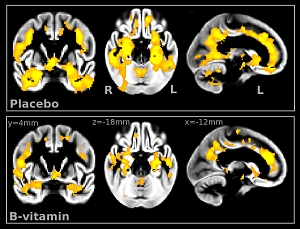 Areas of degeneration of grey matter (yellow) over a 2 year period in Alzheimer's disease patients in groups receiving placebo (top) or B vitamin treatment (bottom). [Figure 1 from Douaud et al. (2013) PNAS (early edition online ahead of print)]
Areas of degeneration of grey matter (yellow) over a 2 year period in Alzheimer's disease patients in groups receiving placebo (top) or B vitamin treatment (bottom). [Figure 1 from Douaud et al. (2013) PNAS (early edition online ahead of print)]David Smith, Honorary Associate Director of the Unit and Professor Emeritus of Pharmacology at the University of Oxford and his team has shown that large doses of three B vitamins (folic acid, vitamins B12 and B6) specifically slow the shrinkage of the brain areas vulnerable to dementia by as much as 90 per cent. David says: “Our work shows that a key part of the process that leads to Alzheimer’s disease might be modified by a safe and simple intervention.” His previous studies in the same trial showed that these doses of B vitamins can slow mental decline in the elderly who suffer from mild memory problems. Now the latest analysis of a 2010 clinical trial, part-funded by the MRC, has found that high doses of these vitamins particularly B12 can help to protect the parts of the brain affected by Alzheimer’s disease. David says that this is the first time that a treatment has been shown to modify the disease process and so it holds out the hope that other causes of brain atrophy, such as hypertension and diabetes, both of which are linked to Alzheimer's disease, can be modified to help prevent Alzheimer's disease.
External link to MRC News.
External link to article at PNAS.
